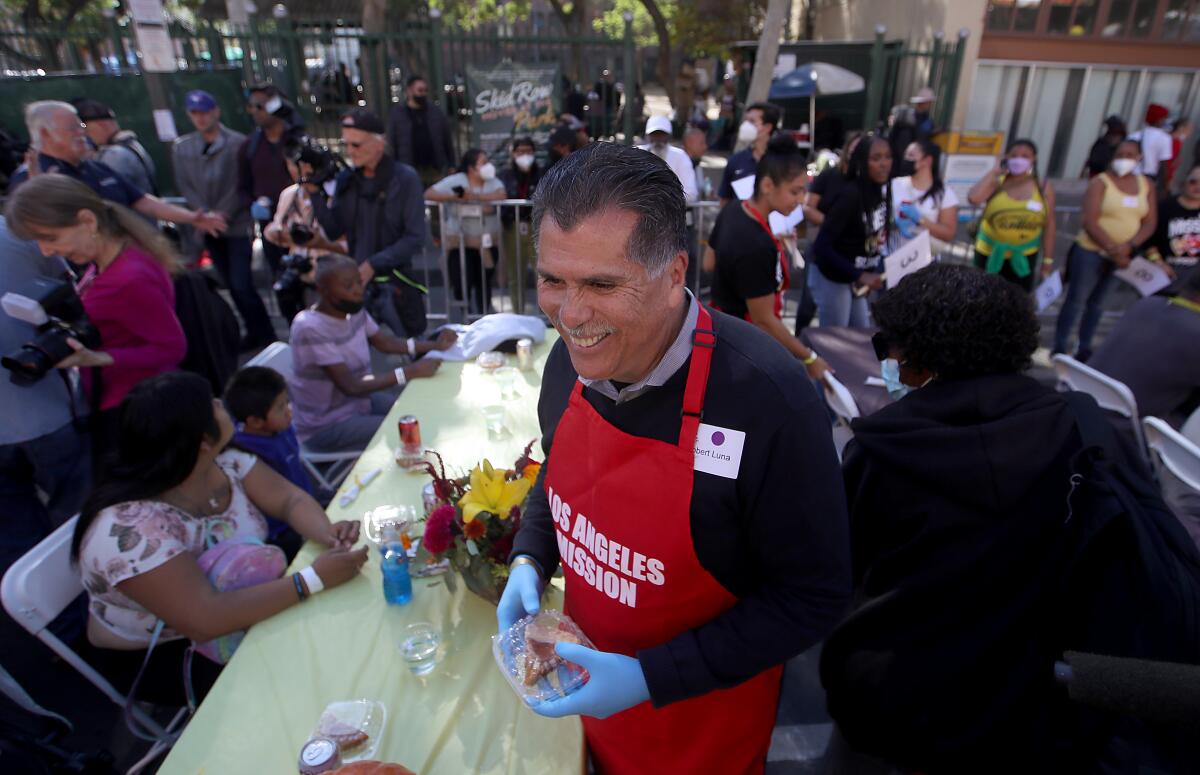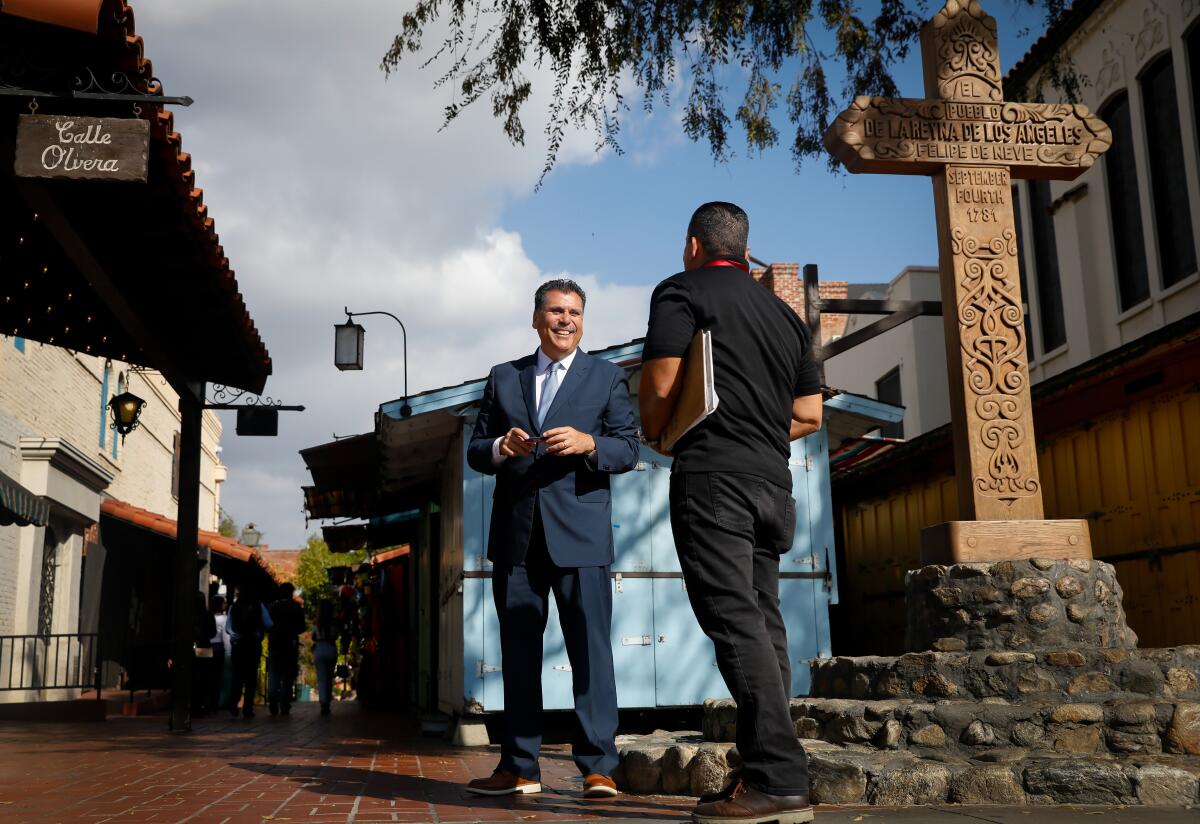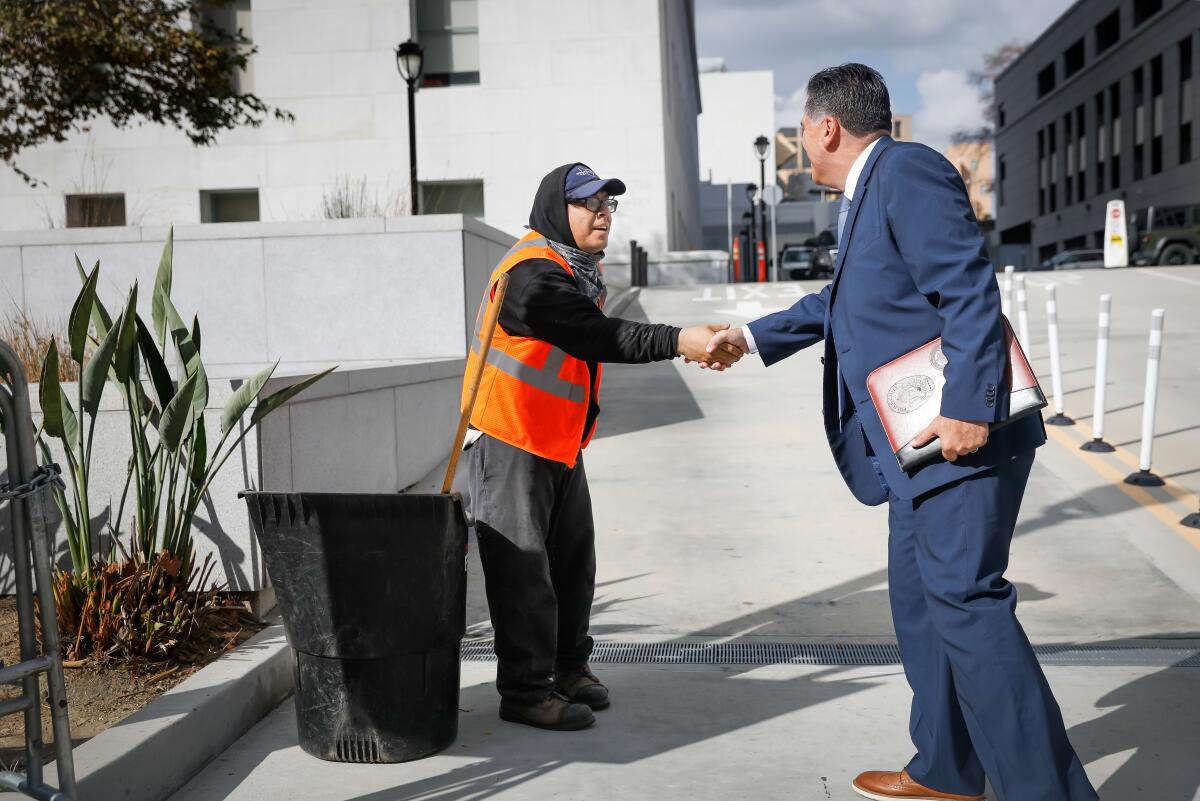Sheriff-elect Luna on ‘fractured relationships’ and challenges ahead post-Villanueva

Robert Luna has wasted no time since he was elected sheriff of the largest department in the country.
Among his biggest challenges will be repairing the damage outgoing Los Angeles County Sheriff Alex Villanueva wrought in a single term in office, rebuilding relationships with jilted county leaders and restoring the public’s faith in a law enforcement agency in turmoil.
In the first three weeks after election day, Luna met or spoke with many of the men and women who were the focus of the outgoing sheriff’s ire: the five members of the Board of Supervisors, with whom he warred for the last four years; Dist. Atty. George Gascón, whose recall Villanueva loudly supported; California Atty. Gen. Rob Bonta; and county Chief Executive Fesia Davenport.
“There are, unfortunately, fractured relationships that need to be fixed,” Luna said in a wide-ranging interview Tuesday, four days before he is scheduled to be sworn in. “Sometimes,” he added, “the way you approach governing makes a huge difference.”

Luna’s outreach to leaders who clashed with Villanueva has also included a “very positive” post-election meeting with county Inspector General Max Huntsman, the sheriff-elect said.
Last month, Villanueva barred Huntsman from Sheriff’s Department facilities and databases in the final escalation of a years-long power struggle between the outgoing sheriff and Huntsman, who alleged Villanueva’s efforts to conceal materials violated the law.
Jessica Pishko, a Texas-based lawyer writing a book about sheriffs who has studied Villanueva, Luna and the county’s Sheriff’s Department, said she thinks the incoming sheriff’s efforts to repair those vital relationships will be successful. But she said it will be more difficult for him to gain the full trust of the citizens he will be serving.
“Honestly, I think he’ll be able to do it,” she said. “Government officials want the government to work. They’re invested in the system working. I think the community is harder.”
Not every task Luna’s undertaken in recent days has been as weighty.
On Nov. 21, the sheriff-elect traveled to a Sheriff’s Department warehouse in Whittier to be fitted for his uniform and receive his service weapon, rain gear and other equipment. He had his professional headshot taken Tuesday morning inside the Hall of Justice, where his office will be .
They’re some of the final mundane tasks the retired Long Beach police chief must complete before he’s sworn in as sheriff Saturday and officially assumes the position at noon Monday. After the photo shoot, Luna sat down with a reporter from The Times — another institution Villanueva battled — to talk about his plans for the department.

One takeaway: While there are many obstacles to quickly reforming the agency, Luna said he intends to hit the ground running.
In an early demonstration of his stated intent to address long-standing problems within the department, Luna said Tuesday that he has “already been talking to some outside agencies” about ongoing investigations into so-called deputy gangs.
“I’ve told them and assured them that with me in charge of this agency, they will get full cooperation,” he said, though he declined to specify which agencies he has communicated with. “We’re going to sit down with them, and I want to know: Have there been any impediments whatsoever? Is anyone resisting giving you records, for example?”
Sean Kennedy, chair of the county Sheriff Civilian Oversight Commission, said he’s spoken with the incoming sheriff by phone. Kennedy said his commitment to cooperating with outside agencies is “a good sign” and that “Luna’s commitment seems stronger than any prior sheriff” to addressing the scourge of deputy gangs.
Still, he said he worries about the ability of any individual to actually make a difference on that front, given how deeply entrenched the gangs are within the rank and file, and even among leaders who rose through the department’s ranks.
“It’s very hard for the leadership to eliminate deputy gangs when they themselves are tattooed members of the deputy gangs,” Kennedy said. “That to me sounds like an incredible challenge for Luna.”

Luna also spoke about his short- and long-term goals as sheriff, among them interviewing and hiring candidates for his leadership team.
On Wednesday, he made a public step in that direction, naming his interim undersheriff and interim chief of staff. April Tardy will be the first female undersheriff in the history of the department, and she is Black, a signal that Luna is paying attention to diversity as he selects the leaders who will comprise his inner circle. During his tenure in Long Beach, Luna was criticized for not having enough Black officers and leaders on his force.
These days Luna can’t make it much more than a few yards without being stopped for a selfie or handshake, whether between professional errands in downtown L.A.’s civic core or strolling by the tiendas of historic Olvera Street, where his father used to take the family for crunchy beef tacos when he was a kid.
“Luna,” admirers call out, skipping ranks and his first name. He pivots in the direction of their shouts, taking more time to connect with people than his handlers might like.
Juan Argueta took a break from raking leaves in front of the Hall of Justice on Tuesday to express his admiration for the sheriff-elect.

“Congratulations on your win,” said the 25-year-old, who works for American Heritage Landscape. “I voted for you. I was pulling for you the entire time. It’s crazy to see you.”
“Thank you. I appreciate that. Thank you very much,” Luna said. “You work here all the time? ... My dad actually worked as a janitor.”
Luna told Argueta about how his father supported his family for years by cleaning school hallways and classrooms. He then encouraged the landscaper to dream big.
“One day, man, I’ll make it out of this,” Argueta replied. “This is an inspiration.”
It was just another moment in the brief transition period between Villanueva’s concession on Nov. 15 and Luna’s pending assumption of the sheriff’s office. But, like a handful of similar interactions he had over the course of an hour Tuesday, it spoke to the connection he made during the campaign with voters, who supported him over Villanueva by a more than 22-point margin.
Luna hopes that goodwill will translate to the support of the roughly 18,000 employees he will supervise as sheriff. But that remains to be seen.
Kennedy said that while it’s encouraging Luna has committed to reforming the Sheriff’s Department, it historically has not been easy for sheriffs to implement major reforms or change the culture of the agency.
“I believe the sheriff-elect is committed to those things, but that’s been the problem for sheriffs for years, is the resistance to those changes,” Kennedy said.
“To the extent that the sheriff can move the needle on those issues, it is by working collaboratively with all the community partners and other agencies instead of being kind of like a lone wolf or rogue sheriff, which is what we’ve had in the past,” he added.

As he repeated many times during the campaign, Luna said his top long-term priorities as sheriff will be bringing down crime, addressing homelessness and restoring trust in the Sheriff’s Department.
He said he wants his deputies to be sensitive to mental health challenges and to work closely with mental health agencies. He said the department will perhaps reconsider how and when deputies respond to mental health crises. He talked about changing the culture of the agency.
But as in so many other Los Angeles conversations this election year, talk kept coming back to crime and homelessness.
Again and again at campaign events across the county, Luna was asked about his plans for fighting crime as sheriff. On Tuesday he described “an actual responsibility” to reduce crime and a strategy driven by data and collaboration.
“‘Accountability’ gets used a lot. But what does that really mean? Well, for me, it’s, for example, being accountable about crime,” he said. “What are our strategies when it comes to reducing crime? How are we going to approach this? What data are we going to use?”
When working to make a dent in L.A. County’s widespread homelessness, Luna said public and private collaboration is key. He said he plans to examine the agency’s existing efforts and find ways to improve them. He said it’s vital that the “public trust and legitimacy” of the department be restored if it’s going to have a meaningful, positive effect on homelessness crisis.
“We’re not going to be able to solve this on our own,” Luna said. “So how do we fit in? And what do we need to improve upon?”
Luna has said since the beginning of his long-shot campaign for sheriff a year ago that he would restore calm to the L.A. County Sheriff’s Department. He’s posed as the antidote to years of scandal and corruption under Villanueva.
Voters seem to have responded to that pitch. But questions remain about the racial makeup of the Long Beach Police Department while Luna led it and allegations by Black former officers that they were discriminated against, both before he was chief and during his tenure.
Questions also remain about whether Luna will stand up to the county supervisors, the Hollywood elite and other powerful figures who backed him during his sheriff’s campaign.
Pishko said she worries Luna’s tenure will “turn the temperature down on the sheriff’s office” and, consequently, on the movement to reform it.
“My greatest concern is, well, once he’s sheriff, no one will talk about the Sheriff’s Department anymore,” the Texas lawyer said. “There could be less of an impetus for big change. … How do you get better policing if he just has this patina of ‘everything is just fine?’”
More to Read
Sign up for Essential California
The most important California stories and recommendations in your inbox every morning.
You may occasionally receive promotional content from the Los Angeles Times.










